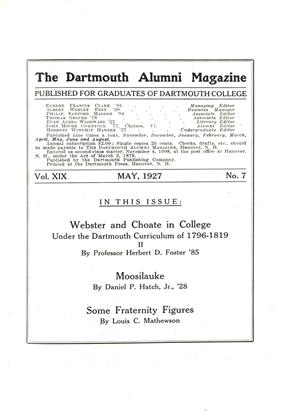Students "stewing in their own juice" are suicide material according to an interview with President Ernest M. Hopkins, of Dartmouth, published in New York City newspapers following the president's return from a cruise in the West Indies. In the same breath he warmly defended the contemporary student against accusations of radicalism and irresponsibility, saying it is the elders of today who are irresponsible.
"Personally," he said, "I do not believe there are any more student suicides now than in my student days. Students always have committed suicide. The student who destroys himself is of the type that indulges in a morbid psychology, has few or no outside interests, thinks too much of himself too frequently addresses himself to introspective study."
He cited Froude in his "History of England" to express his own impression of youthful new ideas : "The most sterile periods in the world's history are those when youth treads in the footsteps of its elders."
"It is necessary for youth to have new ideas, that the world's progress may go on," he continued. "When youth begins to think for itself it causes hysteria in the country, but such hysteria amounts to nothing."
He said that in the youth of Washingon and Hamilton they were radicals of their day; that it is a fallacy to conjecture to-day over what Washington and Hamilton might have thought in their own day, but that such conjectures should be over what those figures would think under modern conditions were they alive to-day.
Dr. Hopkins would not comment on the coeducational feature of the "floating university," the liner Ryndham, explaining that he was too unfamiliar with coeducation. He said there were four Dartmouth students aboard the Ryndham, and that, regardless of the excellence of the course, it would be difficult to credit these students properly when they return to Dartmouth.
 View Full Issue
View Full Issue
More From This Issue
-
 Article
ArticleWEBSTER AND CHOATE IN COLLEGE
May 1927 By Herbert Darling Foster '85 -
 Article
ArticleTHE UNDERGRADUATE CHAIR
May 1927 -
 Article
ArticleMOOSILAUKE
May 1927 By Daniel P. Hatch, Jr. '28 -
 Article
ArticleSOME FRATERNITY FIGURES
May 1927 By Louis C. Mathewson -
 Article
ArticleDARTMOUTH STUDENTS SAID TO BE IRRELIGIOUS
May 1927 -
 Class Notes
Class NotesClass of 1921
May 1927 By Herrick Brown








